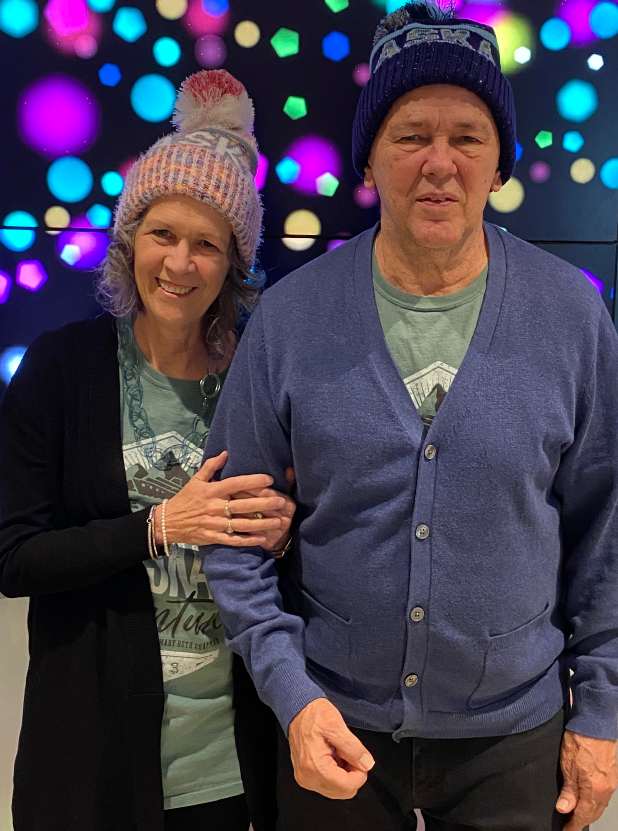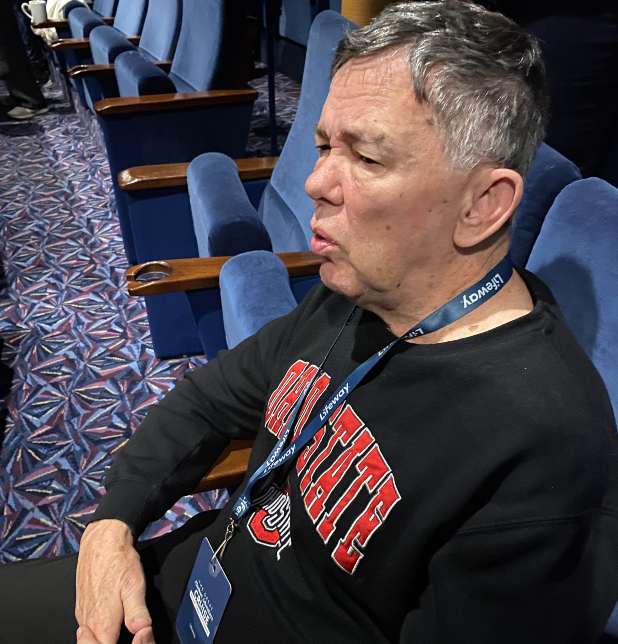Snapshots of Dementia: Have Dementia, Will Travel (Part 2)

We chose the trip together. We talked about it for months. We met with our friends to plan our off-ship excursions. But even the week we left, Tom didn’t remember what day we were going, what city we would fly into, or any of the other details of our Great Alaskan Adventure cruise. His dementia has progressed to the point that I can’t assume he remembers—or even understands—much at all. He still surprises me sometimes with what he does process well, but he surprises me much more often with what he doesn’t.
This happened with the Steven Curtis Chapman part of our cruise: short sessions of Bible teaching, worship, reminiscing and even a Q&A with the Chapmans. We skipped a “Stump Stevie” night because of its late-night scheduling, but we attended all the other sessions.

For some foolish reason, I thought an artist who meant as much to him as SCC would somehow move him to engage. A nice idea, but that’s all it was. More accurately, it was magical thinking on my part. He didn’t seem unhappy, and he always said he was enjoying the trip—but it was hard to tell from his almost-standard expressionless face.
One thing he did enjoy, however, was mealtime. This adventure had the standard cruise blessing (and curse): wonderful, plentiful food. We usually ate in a dining room with multiple buffet lines. The choices, of course, were too much for Tom. Sometimes he walked with me as I filled his plate other times, he sat with our friends while I got his food. He’s never been a foodie, but in the past, he would have especially enjoyed the various international options offered.
His favorites on the cruise looked not-so-suspiciously like what he most enjoys at home: Breakfast omelets. Cheeseburgers (So. Many. Cheeseburgers.) Macaroni and cheese. Cookies. And as a special bonus blessing, ice cream. Although I did get him to venture away from cheeseburgers sometimes, he seemed happiest with his familiar favorites. Sure, it was way more red meat than he would have had at home, but the cruise only lasted a week. And a fortieth anniversary only comes around once.
Tom had some physical challenges on our trip as well. He uses a walker because of a back problem. He can’t have the needed surgery because general anesthesia could exacerbate his cognitive decline. The relatively short trips around the ship required far more walking than he normally does in one day, so his back was already tired. Excursion days—although we chose those with only minimal walking—exhausted him. We almost always had a long walk as we left the ship, so the “few steps” promised for the excursion became many more. If I had known this in advance, I would have brought a wheelchair rather than a walker.
The day we went on the White Pass & Yukon Railway resulted in terrible physical pain for Tom. We met in the same large room that hosted the SCC concerts, so that part seemed easy. But after we arrived, the people in charge hurried us off the ship to catch trams to the waiting buses that would take us to the train.
Avoiding the normal long walk from ship to bus might have been a good thing. What wasn’t good? Navigating several flights of stairs to leave the ship. As everyone rushed past us, not wanting to miss the trams, we moved slowly toward the stairs. Another kind passenger took Tom’s walker, and I helped him shuffle down each flight.
By the time we left the ship, we were far behind the other passengers. I knew Tom couldn’t hurry, and I also knew we might miss the train ride. But the news soon filtered back that the trams were waiting—we weren’t late after all.
From there on, everything went smoothly. The bus even had a wonderful, reserved front seat for people with disabilities. The train ride was spectacular; in fact, we all agreed: This was our favorite excursion. But by the time we got back to the room that afternoon, Tom’s back hurt so much that he spent almost the entire rest of the day in bed.
This was a clear caregiver failure. I should have asked for a wheelchair or at least to take the elevator rather than the stairs. I didn’t.
We remember those lessons we learn the hard way, and I won’t forget this one. I just regret that I did it at the cost of Tom’s health. He recovered well and, by the next day, was able to use his walker again. But overall, the trip was too physically challenging. He had heightened back pain until he received his regular mitigating epidural. And I’ve decided any future travel—even much shorter trips—will include a wheelchair.
But I had more lessons to learn. The next night, I decided we should try an alternate dinner option: a much fancier restaurant. Our friends Hardy and Barbara had done so, and they raved about the food and the experience. But they don’t have dementia.
In this new venue, we still had choices, but from a menu rather than buffet lines. Our scheduled dinnertime was late—7:30—which was why we’d skipped it before. Tom seemed to enjoy both the meal and being with our friends, but I could tell the new setting confused him. I was about to find out just how much.
The servers had moved Tom’s walker out of the way, which meant he forgot he had one. When he needed to go to the restroom, he didn’t tell us; he just got up and started walking—no walker. Hardy, seated beside him, ran after him (Tom can move surprisingly fast), with our attentive server right behind.
I was glad they both went, because the restaurant didn’t even have a restroom, and our server helped Hardy find the nearest one. The next night, we returned to the buffet-line dinner—at an earlier time.
The moments of panic I felt as Tom headed off by himself happened time and again during this trip. He would often turn the wrong way when we came off the elevator or start back into a place we’d just left. Whenever I could, I walked right beside or in front of him, but in a crowded venue, that wasn’t always possible.
People joke about memory loss—and we do that ourselves—but the daily trials of someone LWD are far from funny. When you can’t remember where you are or where you’re going and don’t have the skills to know what to do, you end up confused and lost. And no one enjoys that.
Travel is fun, and travel is good. But travel is also a challenge—especially when someone is LWD. Am I thankful we had this opportunity? So much. Will I do such an extensive trip again? Probably not. For Tom, the challenges may now outweigh the benefits.
But that doesn’t mean we’ll stop having adventures. He and our son are off on another one right now, wheelchair in tow. That one will no doubt show up here as well. In the meantime: Go Buckeyes!
If you or someone you know is living with dementia, what travel challenges have you faced? What solutions have you found? Feel free to share your thoughts in the comment section below or on social media. Our story matters, and so does yours.




